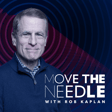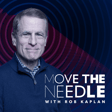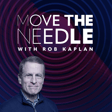
Evan Marwell
This is Move The Needle with Rob Kaplan, where we talk to people who lead, innovate and inspire. Today on Move The Needle, Rob talks with Evan Marwell. He had a super successful business career, but now he wants to take America on the EducationSuperHighway.
Evan Marwell is the Founder and CEO of EducationSuperHighway, the leading non-profit focused on closing the digital divide in America’s most unconnected communities. In eight years, EducationSuperHighway closed the digital divide in America’s K-12 schools – connecting nearly 47 million students in 99.7% of America’s classrooms to high-speed broadband. To accomplish this, Evan secured commitments from 85 governors from all 50 states to upgrade their schools for the 21st century and $2.5 billion per year of federal funding to make these commitments a reality. A recipient of the San Francisco Chronicle’s Visionary of the Year award and a serial entrepreneur, Evan launched companies over the last 25 years in the telecom, software, and hedge fund industries. Evan is an honors graduate of Harvard College and Harvard Business School, board chair of myAgro, a board member at Direct Relief and Recidiviz, and a co-founder of Ignite! Reading, a Zoom-based K-3 reading tutoring program.
#movetheneedlewithevanmarwell #educationsuperhighway #evanmarwell #education #educationforall #americaneducation #nonprofit #harvardbusinessschool #entrepreneur #visionary #recidiviz #movetheneedlewithrobkaplan #samzeff #robkaplan #scottrichardson #ronelgolden


